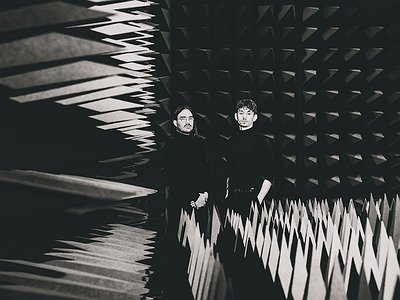Name: ATOEM
Members: Gabriel Renault, Antoine Talon
Nationality: French
Current release: ATOEM's Entropy is out via Solar Production / Yotanka.
If you enjoyed this ATOEM interview and would like to stay up to date with the band and their music, visit their official homepage. They are also on Instagram, Facebook, and Soundcloud.
For a deeper look behind Entropy, read our previous ATOEM interview.
Some of your synths are self-built. How does that influence the sound of ATOEM?
Antoine studied electronics at the University of Rennes. For his thesis project, he had the idea of making a modular synthesizer. In fact, it's like any synthesizer, except that you can influence the path and construction of the sound, in order to obtain a more complex, more unique sound.
He built everything from scratch, for a few months when the nights were short or even non-existent: the electronic boards, the soldering of components, the flightcase, the finishes, and the electronic calibration, etc.
Let's say that the sound that comes out of it is both raw and complex. The electronic diagrams are based on old emblematic electronic music diagrams (ARP, Moog, Steiner, etc…). But by adding layers of sound and structuring the original basic sound, we can obtain a result that is satisfying enough in terms of originality, but also and above all musical enough to be used in a piece.
I recently spoke to Girts from Erica Synths and he essentially told me that building your own synthesizer or even just deconstructing an existing one can teach you things far beyond music. Can you relate to that statement?
Yes, we know the modules of Erica Synths well, they're pretty crazy. We fully share this opinion. When we are interested in the foundation of sound, in the way it is created and transformed, we are better able to work on this kind of complex machine at first sight. Moreover, the fact that we can add layers of sound one by one shows us directly the implication of a parameter on the final result.
It is very convenient to be able to manipulate directly. We are more comfortable with that than with digital tools that are sometimes so complex that they can be off-putting.
What, other than your self-built machines, is currently at the core of your set-up?
For several years we have accumulated many different machines, in order to gradually build our sound and explore more possibilities.
Now on stage, we have synthesizers from the French manufacturer Arturia (Matrixbrute, Polybrute and minifreak). We really like their instruments because they are very innovative and allow us to go far in sound design.
The rhythm part is made by an Elektron Rhythm box (first generation, yes it is getting old). We also have a Moog Sub37, a Prophet 6, a Korg MS-20, but also effects and sound transformation pedals.
How, concretely, does the sound design process work for you? Would you ever use any sound of your machines without adjusting it to your needs first? Are presets “lazy”?
Let's say that we have two different ways of composing.
Antoine has a more experimental approach to sound creation. He likes to spend a lot of time on sound design in order to find a piercing and original sound to compose a sequence which will then become a piece.
Gabriel, on the other hand, has a more academic approach by highlighting the harmonies, the overall narration of a piece without necessarily going into the sound design. These are two different approaches that are ultimately complementary.
Your set-up currently appears to be almost pure analog. I'm not sure how much you have the “option of saving”, but would you say there are general benefits to an approach where things can go wrong and you may not be able to go back?
Yes, most of our installation is analog. Some machines allow you to save presets, others do not. We still have digital tools for the sequencer and sound processing.
Let's say it's a pleasant tool to use because we directly manipulate the sound with our hands. But it is true that it is also a risky option insofar as analog instruments are fragile and sometimes do not support the vagaries of life on tour.
It happened to us that we lost a sound source at a live concert. It's the game, it's risky but that's what we like.




